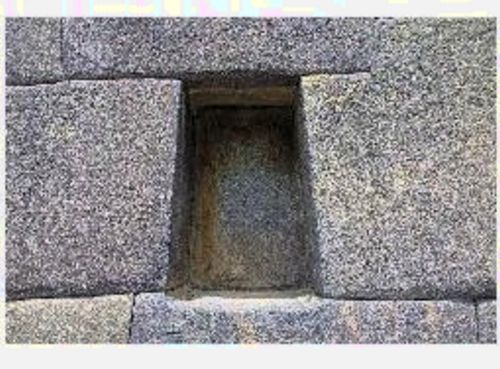
Trapazoidal niche at Incan site in Ollantaytambo, Peru (source)
Media are mutating from mass to niche. OK. We get that. But this image plucked off the Web this captures not only the tinyness of the word but also the characterteristic that is its primary definition, “an ornamental recess in a wall.”
That recess is a subtraction from the wall and that subtractive quality is what struck me this morning when I read a blurb in Paid Content announcing that a former Boston Globe political columnist will become managing editor of Politicker.com, a soon-to-be network of state-specific political news websites that appear poised to sprout from the New York Observer, the political weekly based in Manhattan.
By all means read the press release for details, but the web site isn’t live and its plans or prospects are not my point. Rather this announcement is a case is exemplary of the subtraction that has started and will continue to hit the journalism side of media just as it has already rocked the business side of media. We’re all familiar with this latter concept. Craig’s List started to subtract classified ad revenues; Monster.com et all started to poach on the job-wanted ads; Yahoo and its cohort have siphoned off display advertising, and so on.
Politicker.com shows how the subtractive process will unfold on the content-producing side. A mass media firm, especially the daily newspapers that I know best, is an organization of generalists. This may generate some objections because there are indeed specializations, between writers and photographers, for instance; and copy editors differ from assigning editors and so on. But a mainstream media organization demands generalization of its content producers because today the mass audience may be focused on the earthquake, tomorrow the coup, the day after that the grisly murder and so on. This is fresh in my mind because this week, I returned to work after a two-week vacation to do an obituary, two different stories on storm damage and one on my beat, which is technology. That’s not a bad thing so far as I am concerned because it breaks the monotony and in some cases is pure fun, such as when I got to slide down a muddy hillside with a storm damage repair crew. With that story occurred another novelty in my work life — I had my first photo published in the paper using the multimedia camera I was carrying. I am a reporter in a union shop that went on strike in 1994, in part over an issue that was framed as “no cameras for photographers.” I walked the picket line back then even though I have always felt that, on that issue, the union was wrong. Anyhow, I guess that’s settled.
But the shakeup in who creates what parts of content, where and how is only going to accelerate as the Politicker.com thing demonstrates. Every mass media outlet of consequence has a statehouse staff. Will Politicker.com now suck the political reporting function out of the paper and centralize it somewhere? I don’t know if that particular business will succeed but I am convinced the answer is YES! because the inexorable power of nichification is driven by the impulse toward efficiency. Thats what economics is all about. The drive for efficiency. And in so many walks of life specialization is efficient. Boring, maybe, but efficient. God forbid you ever need coronary artery bypass surgery for instance make sure you pick the place that has the drive-thru CABG window because you do not want Dr. Marcus Welby cutting open your chest, you want the sonofabitch who splices arteries for a living.
How well does that analogy transfer to content and how does all this play out? How the hell would I know. But I am certain that every force in the world of media is prying loose the mortar in that wall I depicted above, and popping out stones at an accelerating pace. What I lay awake some nights wondering is: how many stones have to pop out before the godamn wall breaks?